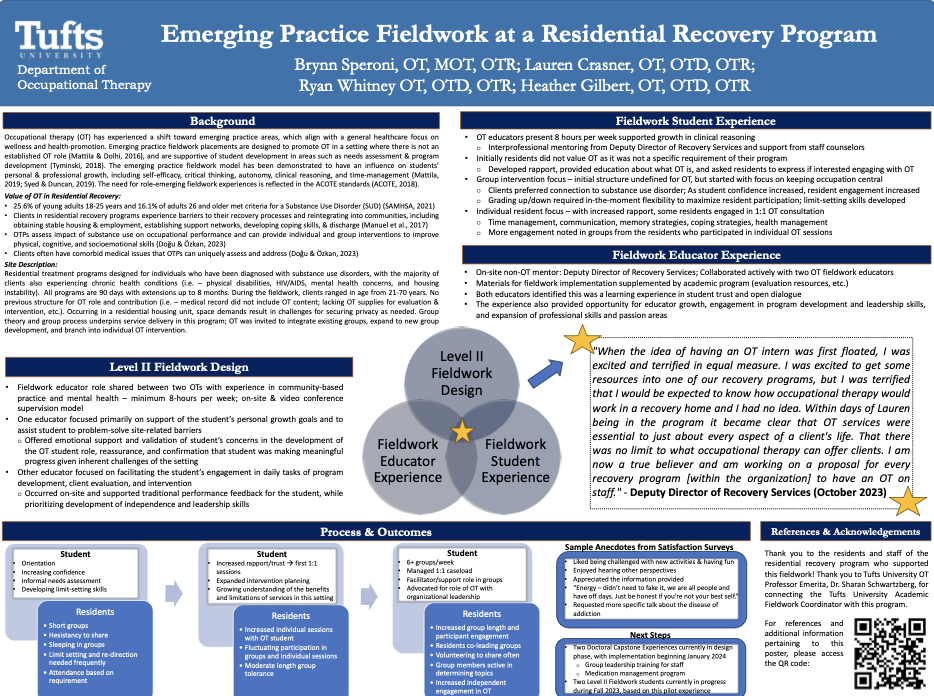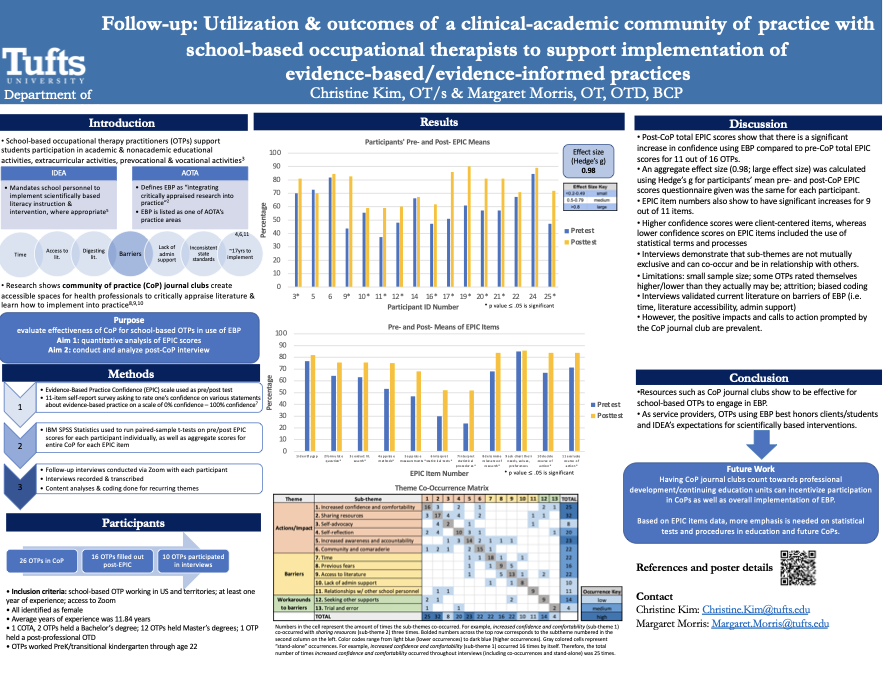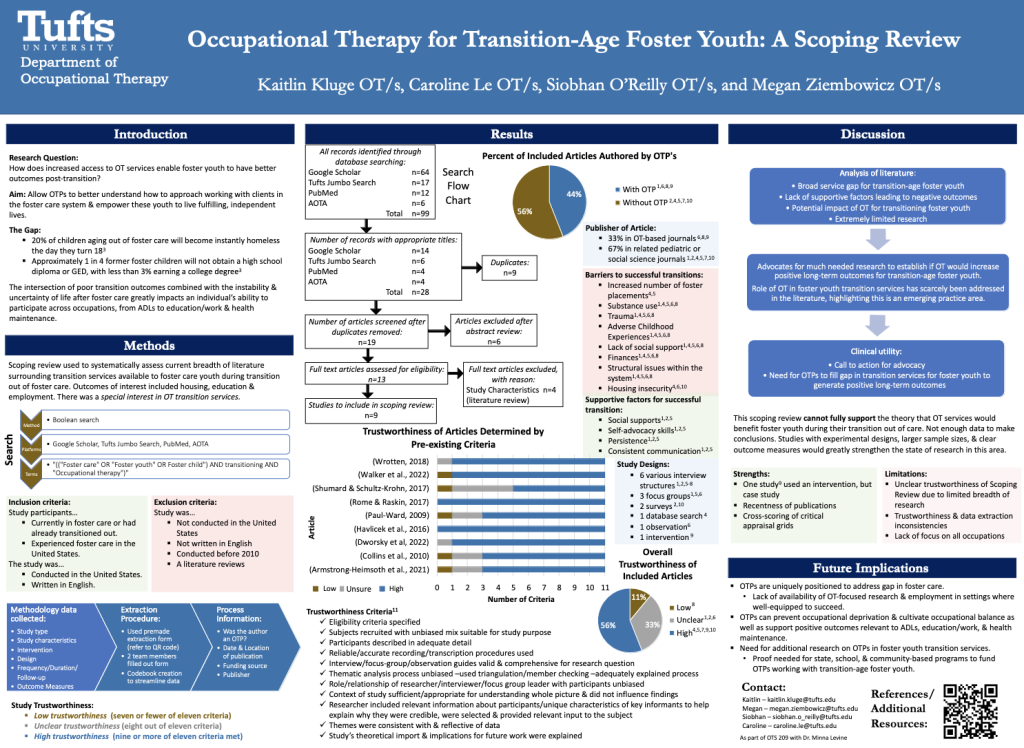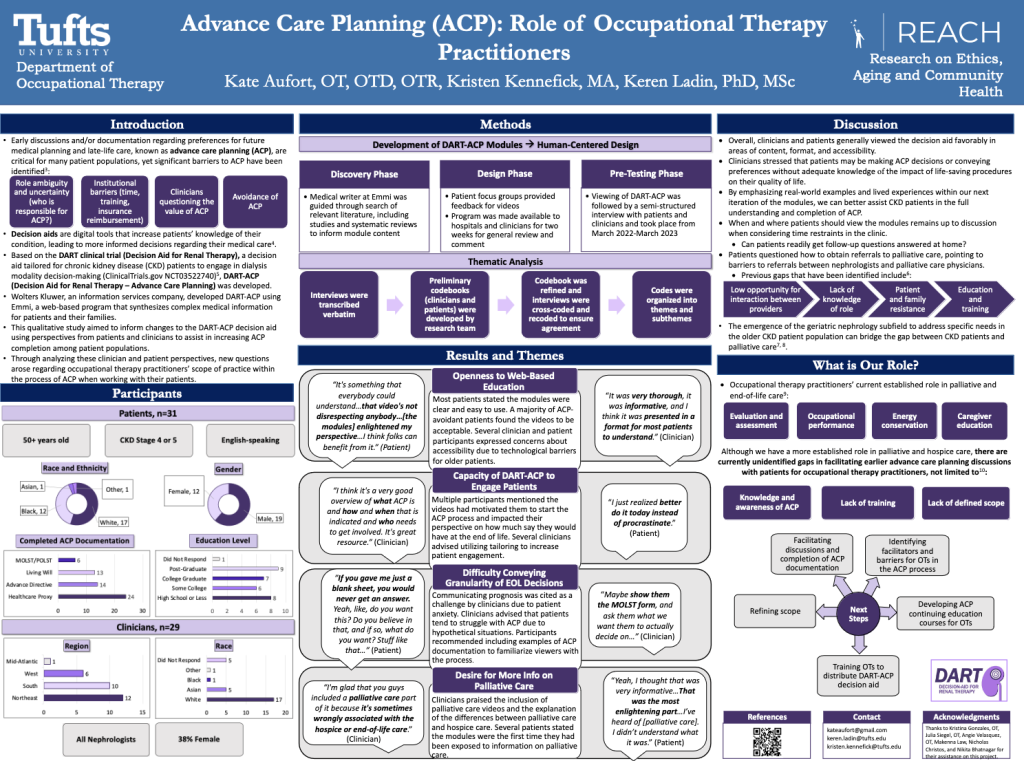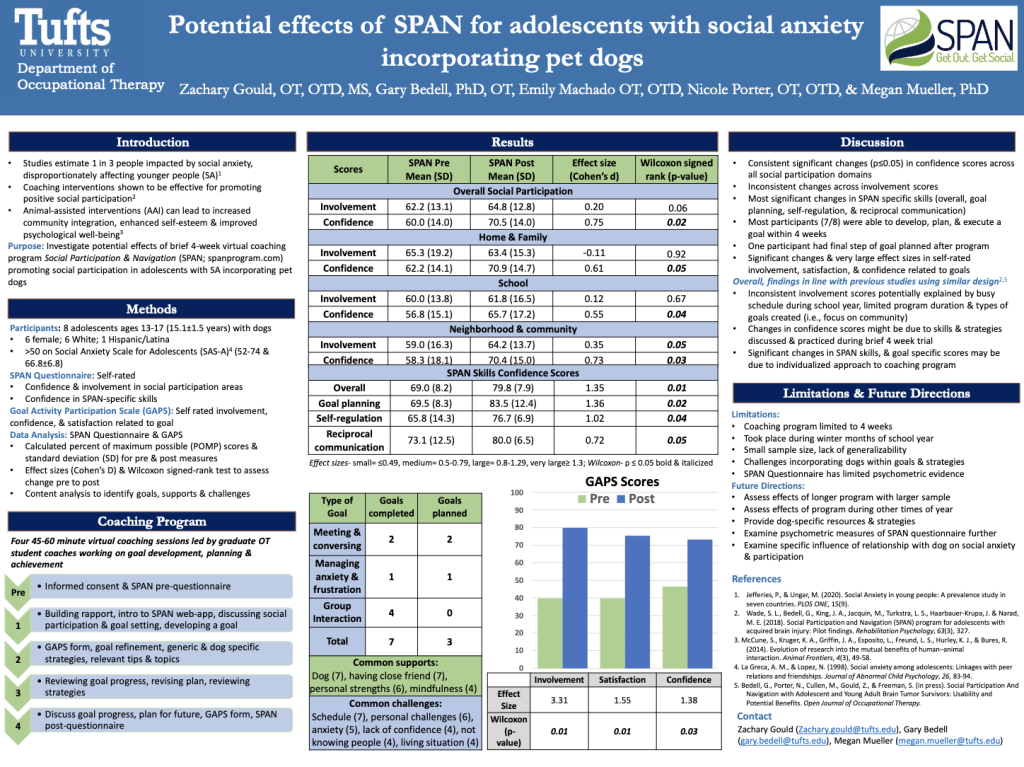Fall 2023 MAOT and Spring 2024 AOTA Presentations
Emerging Practice Fieldwork at a Residential Recovery Program
Brynn Speroni, OT, MOT, OTR; Lauren Crasner, OT, OTD, OTR; Ryan Whitney OT, OTD, OTR; Heather Gilbert, OT, OTD, OTR
Emerging practice area fieldworks are being utilized due to growing evidence of positive outcomes for occupational therapy (OT) practitioners and students, as well as individuals served. A pilot OT level II fieldwork was conducted in residential recovery services. The experience provided the student and supervising practitioners with opportunity for growth in the areas of program development, advocacy, and clinical reasoning. Information from client satisfaction surveys regarding experiences in OT led groups will be presented. More …
Evidence-based Practice Comfortability Improvements for School-based Practitioners
Christine Kim, OT, OTD & Margaret Morris, OT, OTD
School-based occupational therapy practitioners (OTPs) work under legislative requirements of the Individuals with Disabilities Act (IDEA) and Every Student Succeeds Act (ESSA); one requirement is to use “scientifically-based research”. The American Occupational Therapy Association (AOTA) describes our profession as ‘evidence-based’ in its mission. More …
Evaluating the Impact of Immersive Virtual Reality in an Inpatient Rehabilitation Hospital
Anna Leffler OT, OTD, OTR, Kimberly Van Daley MS, PT, & Nancy Baker OT, ScD, MPH, FAOTA
Immersive virtual reality (IVR) can be a valuable nonpharmaceutical based intervention for pain. Project aimed to address feasibility of implementing IVR in clinical practice. 16 patients at Encompass Health Rehabilitation Hospital of Braintree participated. 7/16 reported pre- and post-pain levels with 6/7 seeing a reduction in pain with an average of a 66% reduction in symptoms. More …
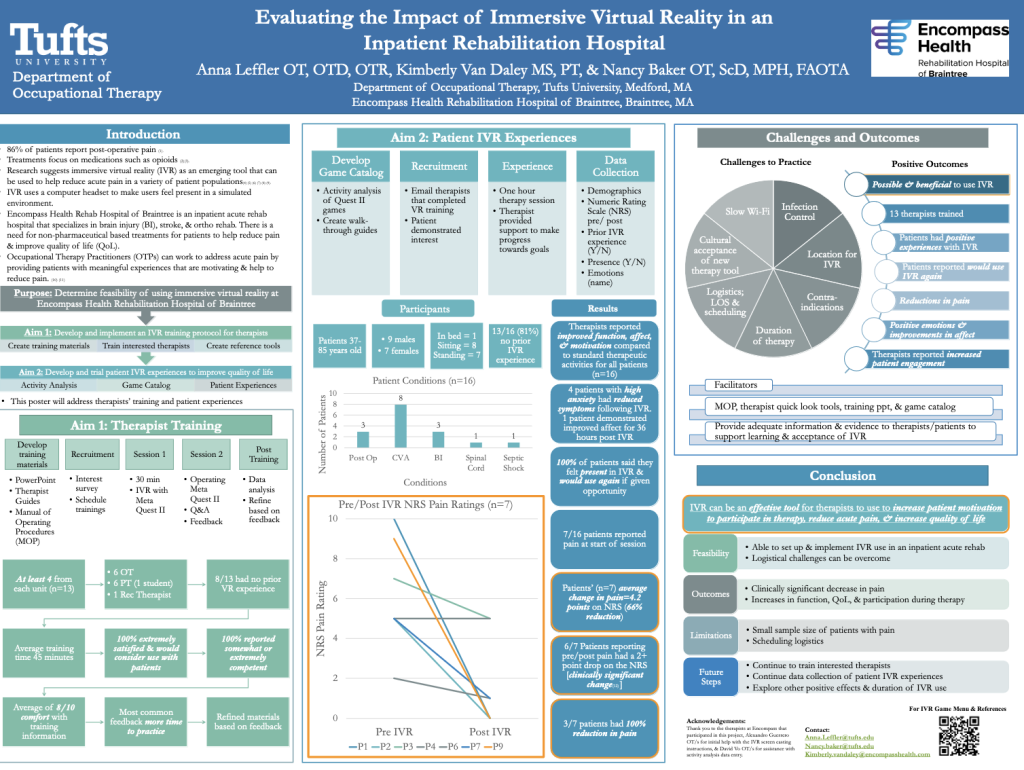
School-Based Support for Student with Sickle Cell Disease
Siarah Jones, OT/s, Tufts University & Margaret Morris, OT, OTD, OTR, BCP, Tufts University
When discussing chronic conditions in school-based practice there is a common gap across resources, which is the failure to address the needs of children with sickle cell disease (SCD), which primarily affects Black children. Literature review and informal retrospective interviews with a SCD survivor and her mother were used to: explore and illustrate the impacts of SCD on these individuals as the student aged through the school system and guide development of resources for families and training school personnel. More …
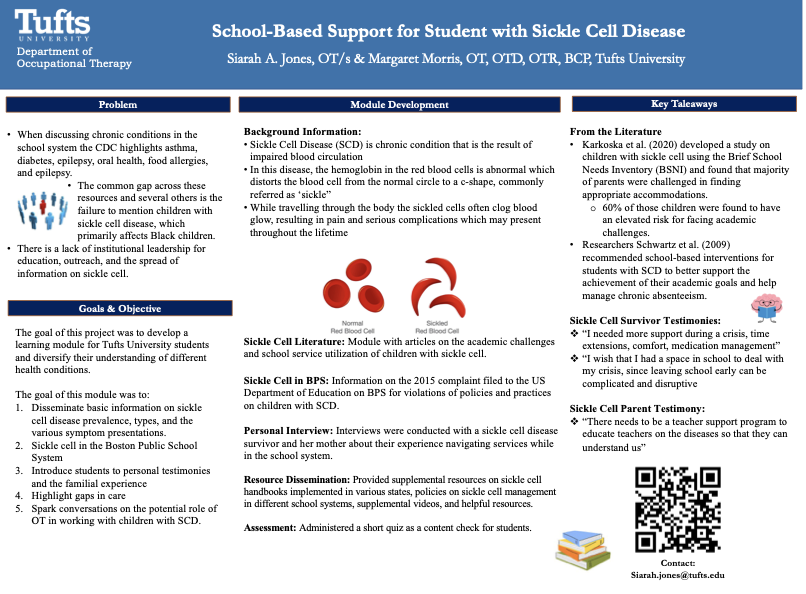
Piloting Let’s Breathe and Learning to BREATHE: Evaluating the use and desirability of a trauma-sensitive, self-regulation and mindfulness program for students at Flying Kites Academy in rural Kenya
Lauren Crasner, OT, OTD, Augusta Hixon Polhemus, OT, OTD
Students attending Flying Kites Academy (FKA) have been exposed to trauma throughout their lives (Nikulina et al., 2011). They want to learn how to cope, but FKA does not have the time or resources to implement programs. Trauma-sensitive, self-regulation mindfulness programs Let’s Breathe! and Learning to BREATHE (L2B) were created and adapted for use at FKA. Mindfulness can improve cognitive performance, resilience to stress, and overall school and occupational performance (Bostic et al., 2015). More …
Occupational Therapy for Transition-Age Foster Youth: A Scoping Review
Kaitlin Kluge OT/s, Caroline Le OT/s, Siobhan O’Reilly OT/s, and Megan Ziembowicz
OT/s
Foster youth transitioning out of care face a plethora of challenges. Occupational
therapists (OTs) need to study this unique demographic to better provide services. This scoping
review analyzed the systematic search results of four databases to assess research on
transition-age foster youth and OT services. The population of interest was foster youth ages 16
to 22. According to the literature, there is a need for additional services and a palpable role for
OTs. More …
Advance Care Planning (ACP): Role of Occupational Therapy Practitioners
Kate Aufort, OT, OTD, OTR, Kristen Kennefick, MA, Keren Ladin, PhD, MSc
Early discussions/documentation regarding preferences for future medical planning and late-life care, known as advance care planning (ACP), are critical. Significant barriers to ACP have been identified: role ambiguity and uncertainty, institutional barriers, clinicians questioning value of ACP, avoidance of ACP. Qualitative study informed changes to existing healthcare decision aid based on clinician/patient perspectives. More …
Potential effects of SPAN for adolescents with social anxiety incorporating pet dogs
Zachary Gould, OT, OTD, MS, Gary Bedell, PhD, OT, Emily Machado OT, OTD, Nicole Porter, OT, OTD, & Megan Mueller, PhD
This poster will present results of a 4-week virtual coaching program incorporating pet dogs for promoting social participation in 8 adolescents with social anxiety. This program combines pet-assisted intervention with 4 virtual coaching sessions to develop person-centered, social participation goals. All participants developed at least one goal and most (7/8) achieved their goal during the program. More…

